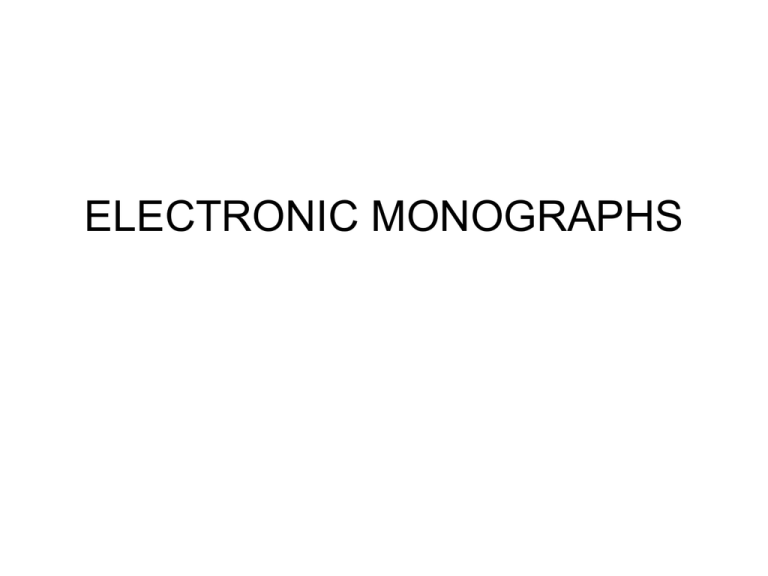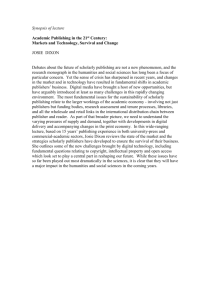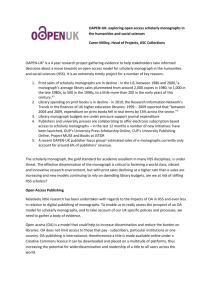e-monographs
advertisement

ELECTRONIC MONOGRAPHS 2001 • • • • • • • • • • • • • • • Abstract Electronic Solutions to the Problems of Monograph Publishing examines the suggestion that the so-called monograph crisis can be overcome by making use of the possibilities of electronic publishing. Research monographs are the preferred way in which scholarship is communicated in most disciplines in the humanities and some in the social sciences. The problems faced by publishers influence the practices of the scholars themselves. This study examines the nature of the crisis in the print environment, the aspirations of scholarly publishers in the electronic environment and the attitudes of and impacts on other parts of the information chain. There is as yet little experience of electronic monographs, so the emphasis is on the projections of the various players and on the major experiments that are being funded. There is nevertheless consideration of the practical aspects of making content available in digital form. No immediate solution is presented but there are pointers to fruitful future developments. Definition • • • • • • • • • • • • “The monograph is a large, specialized work of scholarship that treats a narrow topic in great detail. Size is a critical characteristic, because it distinguishes the monograph from the article, which has the same purpose, but is small. The monograph is the product of a large project usually carried out by an individual scholar. It presents what the scholar has concluded is the truth about some set of historical events, the characteristics of some work of art or literature or the biography of a historical figure, an artist or a writer. This list does not exhaust the categories of possible topics of monographs, but makes the general point that monographs are principally about establishing facts or narratives in a set of fields in which facts and narratives are often hard to establish. Together with critical reviews and articles, monographs provide the foundations for general explanations in these fields. 2001 • “It is simply not profitable. Monographs are not published to make money but to fulfil a scholarly obligation”. (US University Press) 2001 “As authors I think my patrons will generally avoid electronic-only book publication, both because it is risky in terms of copyright protection and because it is a low prestige way to publish. At this point in the development of the marketplace, I cannot imagine anyone going to the trouble to write a book without the reasonable prospect of print publication.” [a senior US librarian] 2001 Conclusion 1 There is a crisis in monograph publishing in print and it will worsen. That is clear from the projections by the publishers. I cannot see more funding for books becoming available as part of library budgets. This is the central problem. I can see a lot fewer monographs being published and I suspect young scholars will soon characteristically draw some articles from their dissertations and rely on what is now easy access to the thesis itself. I may be underestimating either the conservatism of the academic or alternatively the real needs of scholarly discourse – or both. It is possible that, as the larger presses withdraw from publishing more than a token number of monographs in the humanities, smaller presses will take advantage of lower overheads and probably more efficient working with the academic community to fill the gap. But this will be only a partial replacement and margins will be very low. 2001 Conclusion 2 I think there will be more electronic-only monographs as delivery channels improve but this will not be a long-term solution. I am particularly taken by the suggestion by one university press that scholars will accept electronic-only if they have no possibility of publishing in print because their subject area is so specialised/ commercially uninteresting. If there are lower costs they will be balanced by lower income, while the basic costs of the editorial process will remain the same. Publishing monographs simultaneously in both print and electronic versions is not (to my mind) going to work. Making available new channels will work for some types of books but for R2R monographs there is the basic problem that the number of potential readers is inherently small. Is it smaller than in the past and is that why print runs have been reduced as sales have declined? No – it is just that libraries no longer hold books to keep a collection complete or just in case someone might want to read them. Just-in-time library policies will remain the norm and indeed electronic access will probably enable their extension 2001 Conclusion 3 There is no electronic solution to the crisis, if monographs continue to be much as they are at the moment. There may be (is) short term additional revenue but I cannot see the business models of the publisher partners standing up in the medium term. There is just not enough money around to cover what are in fact significantly increased costs, which have to be carried by some part of the chain. 2001 Conclusion 4 • • • • • • • • • • • However I can see such models of co-operation between different sectors as the History eBook project having some sort of validity. As I have mentioned in the study the Association of Research Libraries (ARL) through its SPARC project has tried to forge alliances with non-profit publishers (in this case learned society presses) and individual groups of academics to create competition in the world of (as they see it) overpriced STM journals. I think that there is scope for the development of a different sort of co-operative enterprise, organised along lines only just beginning to emerge. I also think it could be successful. It will only work if it aims to make money by which I mean that the model takes into account the understanding of the way publishing works which publishers tend to have and does not flirt with cost-recovery models. A surplus is always needed for investment. 2001 Conclusion 5 I like the model of aggregation online too. Again there is scope for more developments along these lines and co-operation between publishers on a larger scale than currently. Such models will work better if they are less parochial, i.e. more international, and they admit that commercial publishers have something to offer. Electronic networks lend themselves to distributed arrangement and developments of the subscription model, taking advantage of the way in which licenses have been stabilised in the serials environment, do look hopeful. 2001 Conclusion 6 I am not sure about the subscription model. Publishers from serial backgrounds looking at scholarly book publishing have always sort to find a way of selling by subscription. Often this does not work. However the subscription model, in spite of all the problems they have had with serials, still appeals to librarians: it makes it possible to budget. Current examples: T&F • Welcome Our renowned book publishing programme encompasses the imprints: Routledge, Routledge-Cavendish, Garland, CRC Press, Psychology Press and Taylor & Francis.The Taylor & Francis eBookstore features a quality collection of titles that you can buy in the current popular formats, now including DX Portable. Prices listed on this site are for individual purchasers only. Institutional customers wishing to purchase networkable versions should contact: reference.online@tandf.co.uk for a full price list and further details or click on the Annual Subscription Package or eBooks for Libraries button on this page for a full list of options.Our eSubscribe and DX Portable services provide the convenience of online and offline subscriptions. Besides outright purchases and subscriptions, our ePrint, eCopy and eCompile services bring the advantage of cost-effective page/chapter micro-purchases of content.To keep up-to-date with our latest publications and special offers, and to receive regular news in your areas of interest, please register for our eUpdates service [http://www.ebookstore.tandf.co.uk/html/index.asp] Current Examples: Springer • • • • • Springer eBook Collection [http://www.springer.com/e-content/ebooks?SGWID=040791-0-0-0] The world's most comprehensive online scientific book collection Introducing the world’s most comprehensive digitized scientific, technical and medical (STM) book collection. • More than 3,500 New eBooks and eReference Works Every Year • Ownership Business Model • Unlimited Simultaneous Use • Over 30,000 eBooks Available Available through SpringerLink’s IP-enabled eBook gateway libraries and corporations can offer their patrons online access to the most worthwhile books instantly from multiple locations, including library, office, home or wherever they are. Springer’s eBook Collection uses the portability, searchability, and unparalleled ease of access of PDF and HTML data formats to make access for researchers, as convenient as possible. Springer eBook Collections offer accurate reproductions of high quality Springer print book publications, together with all the added benefits of an online environment, including exceptional search capabilities and bookmarks. Current Examples: Springer MyCopy • • • • • • • • New eBook Feature: Introducing MyCopy Pilot project allows eBook users to order soft cover books through SpringerLink Springer has launched MyCopy powered by SpringerLink, a pilot project to expand its services to eBook users. What is MyCopy? MyCopy allows a library’s registered patrons to order soft cover copies, for their personal use, of those Springer eBooks that the library has previously purchased. Initially, 14 selected libraries and research institutions in the USA and Canada take part in the pilot project with more test partners set to join in early 2009. How does it work? The MyCopy offer is currently valid for more than 11,000 eBooks out of a total of 30,000 Springer eBooks published since 2005. MyCopy books feature a full color cover while the book content itself is printed in black and white. They can be ordered by registered patrons at libraries that have previously purchased a Springer eBook collection. All MyCopy books are priced at $24.95 (including shipping and handling within the USA and Canada). [http://www.springer.com/econtent/ebooks/my+copy?SGWID=0-165802-0-0-0] Current Examples: OUP • Oxford Scholarship Online is a vast and rapidly expanding crosssearchable library which now offers quick and easy access to the full text of 2,763 Oxford books. In addition to Economics and Finance, Philosophy, Political Science, and Religion, Oxford Scholarship Online now provides access to new Oxford books in Biology, Business and Management, Classical Studies, History, Law, Linguistics, Literature, Mathematics, Music, Neuroscience, Physics, Psychology and Social Work. Specially-commissioned abstracts and keywords are available at book and chapter level (free to non-subscribed users), and at least 400 new and recently-published books are added each year. [http://www.oxfordscholarship.com//oso/public/index.html] Current Examples: Bloomsbury • • Welcome to the Bloomsbury Academic Brochure Site Bloomsbury Academic is a new scholarly imprint with a new business model. We publish research-led books across the humanities and social sciences and seek to develop innovative lists on a thematic basis, in fields of current global interest. We are the first major publishing company to provide online access to our research-based books free of charge. Our titles carry a Creative Commons licence allowing readers noncommercial use. At the same time we produce attractively printed books that are promoted and sold globally. For more information see our NEWS Items and FAQs. If you would like to submit a proposal have a look at our AUTHORS section To receive our quarterly e-Newsletter and be notified of our latest releases, please click here. Our state-of-the-art platform is currently under development by iFactory and will be operational later this year.[http://www.bloomsburyacademic.com/] Current Examples: OAPEN • Publishing humanities monographs in Open Access • OAPEN is a project in Open Access publishing for humanities and social sciences monographs. The consortium of University-based academic publishers who make up OAPEN believe that the time is ripe to bring the successes of scientific Open Access publishing to the humanities and social sciences. • The OAPEN partners are all active in the Open Access movement already, with details available on their pages on this site and on their own websites. • The project will find useful, exciting and beneficial ways of publishing scholarly work in Open Access, enhancing access to important peer reviewed research from across Europe. Most importantly it will find a financial model which is appropriate to scholarly humanities monographs, a publishing platform which is beneficial to all users and create a network of publishing partners across Europe and the rest of the world. [http://www.oapen.org/] Future ?


